
Buying a Bosch dishwasher can be incredibly confusing.
With so many series to choose from – 100, 300, 500, 800, and Benchmark – it’s hard to know which one is right for you.
Plus, Bosch’s latest models for 2025 come with the best drying technology in the industry, smarter features, and better overall performance.
After testing countless dishwashers and analyzing over 33,000 real service calls, I’ve narrowed down the five best Bosch dishwashers based on cleaning performance, drying efficiency, noise levels, and long-term reliability.
I’ll also highlight two Bosch dishwashers you should avoid, including one surprisingly recommended by my friends at Wirecutter (The New York Times).
Plus, you’ll get a quick comparison between Bosch and its top competitors – LG, Miele, and KitchenAid – so you can make the best decision.
And at the very end, you’ll find a simple guide of every Bosch dishwasher cycle and feature, so you know exactly what you’re getting.
Let’s dive in.
Best Bosch Dishwashers for 2025: Top Picks & Reviews
Bosch SHX5AEM5N ($799–$899)
Overview
If you want Bosch’s reliability without paying a premium price, the 100 Series is your best option.
The old Bosch Ascenta line has been rebranded into the 100 Series, 100 Plus Series, and 100 Premium Series.
Unlike Bosch’s higher-end dishwashers, the 100 Series features a hybrid tub with stainless steel walls and a plastic bottom.
It also relies on PureDry drying, which uses the heat from the wash cycle, JetDry, and time to dry your dishes.
Every Bosch dishwasher comes equipped with PrecisionWash, a sensor-driven system that adjusts the wash cycle based on how dirty your dishes are.
Plus, you can operate it remotely via the Bosch Home Connect app.
The key differences between the 100 Series, 100 Plus, and 100 Premium come down to noise levels, rack configurations, and extra features:
Key Features & Differences
100 Series
- Tub: Hybrid design with stainless steel walls and a plastic bottom.
- Noise Level: 50 dB, about as loud as gentle rain.
- Racks: Two fixed racks; no third rack.
- Drying: PureDry, which uses heat from the wash and condensation drying.
- Extras: No cycle indicator light.
100 Plus Series
- Tub: Same hybrid setup as the 100 Series.
- Noise Level: Slightly quieter at 48 dB.
- Racks: Two racks, with an adjustable upper rack thanks to RackMatic.
- Drying: PureDry technology.
- Extras: Features an edge-to-edge recessed handle for a sleeker look.
100 Premium Series
- Tub: Still the same hybrid tub.
- Noise Level: 46 dB, the quietest in this lineup.
- Racks: Includes a third rack for utensils and small items, plus an adjustable middle rack.
- Drying: Continues with PureDry.
- Extras: Features InfoLight, a small red light that projects onto the floor to let you know it’s running.
Who Should Buy the Bosch 100 Series?
You won’t get all the premium features of Bosch’s higher-end models, but the 100 Series offers unmatched reliability at an affordable price.
For builders and developers, the Bosch name carries weight, making it a solid choice for new construction or rental properties.
However, homeowners might prefer more advanced models with quieter operation and better drying performance.
Pros and Cons of the Bosch SHX5AEM5N
Pros:
- Affordable Bosch-branded option
- Reliable and well-built for the price
- Includes key wash cycles found in premium Bosch models
- Smart functionality with app control
- Hidden controls with RackMatic on select models
Cons:
- Noticeably louder than Bosch’s higher-end dishwashers
- Shallower racks, limiting space for large items
- Lighter doors, which can feel less sturdy
Not Worth the Upgrade: Bosch SHE53C85N ($899-$1,099)
Overview
The Bosch 300 Series improves on the 100 Series with a full stainless steel tub, quieter operation, and better loading flexibility.
However, at this price point, it falls short compared to the Bosch 500 Series, which offers superior drying technology and quieter performance for just $100 more.
Last year, Wirecutter praised this dishwasher for including all essential cycles, but its price-to-feature ratio makes it a less compelling choice.
Unlike the 100 Series, the 300 Series always includes a third rack, a more adjustable middle rack, and a stainless steel tub for better durability and drying performance.
Yet, it still relies on basic condensation drying and, at 46 dB, is only slightly quieter than some upgraded 100 Series models.
The main differences between the 100 and 300 Series come down to tub material, drying efficiency, noise levels, rack configurations, and wash features.
Key Features & Differences
Tub Material
- 100 Series: Hybrid tub (stainless steel walls with a plastic bottom)
- 300 Series: Full stainless steel tub for better drying and durability
Drying System
- 100 Series: PureDry, a basic condensation drying system
- 300 Series: Also condensation drying, but the stainless tub improves efficiency
Noise Level
- 100 Series: 50 – 46 dB, depending on the model
- 300 Series: 46 dB across all models (quieter, but still audible)
Racks & Loading Flexibility
- 100 Series: Two racks, third rack only on 100 Premium
- 300 Series: Always includes a third rack, plus RackMatic height adjustability
Wash Cycles & Features
- 100 Series: Basic wash cycles with no specialty options
- 300 Series: Adds Speed60 (1-hour wash), Extra Dry, and improved soil detection
Design & Control Panel
- 100 Series: Limited handle options (recessed or pocket handles)
- 300 Series: More style choices, including bar handle, pocket handle, recessed designs, and panel-ready models
Who Should Buy the Bosch 300 Series?
The 300 Series is a decent mid-range option, but its price makes it less appealing compared to the 500 Series.
It’s best for:
- Buyers who prioritize a full stainless steel tub but don’t want to upgrade to the 500 Series
- Those who want a third rack for extra loading flexibility
- Homeowners who don’t need Bosch’s premium drying technology
However, at $999 to $1,099, it’s only $100 less than the 500 Series, which offers better drying (AutoAir or CrystalDry), quieter operation, and improved performance.
For most buyers, the 500 Series is the better choice and a worthwhile upgrade.
Next, we’ll cover the 500 Series and why it’s a smarter investment.
Pros and Cons of the Bosch 300 Series
Pros:
- Full stainless steel tub for improved durability and drying
- Quieter than most 100 Series models (46 dB)
- Always includes a third rack for extra storage
- More wash cycles and better soil detection
Cons:
- Still relies on basic condensation drying
- At 46 dB, it’s not as quiet as Bosch’s premium models
- Only $100 less than the 500 Series, which has much better drying performance
Bosch 500 Series Dishwasher SHP65CP5N ($999-$1,199)
Overview
The 500 Series is where Bosch’s best dishwashers start. It builds on the 300 Series with quieter operation, better drying performance, and improved loading flexibility.
The biggest upgrade is AutoAir drying, which automatically pops the door open at the end of the cycle to release moisture and speed up drying – a noticeable improvement, especially for plastic dishes.
Key Differences: Bosch 300 Series vs. 500 Series
Tub Material & Drying Performance
- 300 Series: Full stainless steel tub, but uses standard condensation drying.
- 500 Series: Full stainless steel tub with AutoAir drying, which pops the door open at the end of the cycle for faster drying.
- Key Upgrade: AutoAir makes a big difference, especially for plastics.
Noise Level
- 300 Series: 46 dB
- 500 Series: 44 dB, meeting the industry standard for quiet dishwashers.
- Key Upgrade: Not a huge difference, but the 500 Series is consistently quieter.
Racks & Loading Flexibility
- 300 Series: Third rack included for utensils and small items.
- 500 Series: Upgraded third rack with flexible loading options and an adjustable middle rack.
- Key Upgrade: Better organization and adjustability in the 500 Series.
Design & Handle Options
- 300 Series: Limited styles (pocket, bar handle, recessed).
- 500 Series: More premium handle options, including sleek bar handle models with touch controls.
- Key Upgrade: More aesthetic choices in the 500 Series – ideal for a high-end kitchen look.
Wash Cycles & Features
- Both Series: Offer similar cycles, including Speed60 (1-hour wash), Extra Dry, and Sanitize.
- Key Upgrade: Not a major functional difference, but drying is significantly better in the 500 Series.
Who Should Buy the Bosch 500 Series?
- Choose the 300 Series if you want a quiet, reliable dishwasher with a stainless steel tub but don’t need AutoAir drying.
- Choose the 500 Series if you want better drying performance, a more flexible third rack, and a quieter dishwasher.
For most, the 500 Series is worth the upgrade.
AutoAir helps with drying performance, especially for plastic dishes, making it a great choice for those who run their dishwasher overnight.
At 44 decibels, the 500 Series meets the industry quietness standard, meaning you won’t hear it running while watching TV in an adjacent room.
Pros and Cons of the Bosch SHP65CP5N
Pros:
- Enhanced drying with AutoAir
- Flexible loading options with an improved third rack
- Meets industry quietness standards (44 dB)
Cons:
- Lacks unique wash cycles beyond standard options
- More expensive compared to other brands in this price range
Bosch 800 Series Dishwasher SHP78CP5N ($1,299 – $1,499)
Overview
The 800 Series offers Bosch’s most advanced cleaning and drying technologies, featuring the PowerControl Wash arm and CrystalDry.
Key Differences: Bosch 500 Series vs. 800 Series
Tub Material & Drying Performance
- 500 Series: AutoAir -The door automatically pops open at the end of the cycle to improve drying.
- 800 Series: CrystalDry – Uses zeolite minerals to absorb moisture and convert it into heat, drying dishes (especially plastics) 40% better than AutoAir.
- Key Upgrade: CrystalDry is Bosch’s best drying system, even plastics come out bone dry.
Noise Level
- 500 Series: 44 dB (very quiet).
- 800 Series: 42–40 dB (even quieter).
- Key Upgrade: The 800 Series is one of the quietest dishwashers available.
Racks & Loading Flexibility
- 500 Series: Third rack with some flexibility.
- 800 Series: Upgraded MyWay Third Rack (on select models) offers deeper space for bowls and larger utensils.
- Key Upgrade: More space and better organization in the 800 Series.
Design & Handle Options
- 500 Series: Limited handle styles (bar, pocket, recessed).
- 800 Series: More premium options, including pocket, bar, recessed, and panel-ready models.
- Key Upgrade: The 800 Series includes “CrystalDry Pocket Handle” models, which are among Bosch’s most popular premium dishwashers.
Wash Cycles & Features
- 500 Series: Standard wash cycles with AutoAir drying.
- 800 Series: PowerControl Wash arm allows you to adjust the spray intensity.
- Key Upgrade: A small but noticeable performance boost, especially for heavily soiled dishes.
Who Should Buy the Bosch 800 Series?
- Choose the 500 Series if you want a reliable dishwasher with AutoAir drying at a lower price point.
- Choose the 800 Series if you want Bosch’s best drying system, quieter operation, and a more customizable wash experience.
With CrystalDry, the Bosch 800 series is the best choice if you want the best drying system, frequently wash plastic dishes, or want the quietest operation.
At 40–42 decibels, the 800 Series is whisper-quiet, ensuring it won’t disrupt conversations or background noise in your home.
Pros and Cons of the Bosch SHP78CP5N
Pros:
- Industry-leading drying with CrystalDry
- Extremely quiet operation (40–42 dB)
- Flexible and spacious MyWay third rack
Cons:
- Higher price at $1,299 on promotion
- Limited additional wash cycles beyond standard options
Bonus: Bosch 800 Series Panel-Ready Dishwasher SHV78CM3N ($1,299–$1,499)
Overview
The Bosch 800 Series SHV78CM3N is a panel-ready dishwasher that blends into your kitchen with a custom cabinet front.
It has the same washing and drying features as the SHP78CP5N but is designed for a built-in look.
Key Features
- CrystalDry Technology: Uses heat-absorbing minerals to dry dishes, including plastics, better than standard drying methods.
- PowerControl Wash Arm: Adjusts spray intensity for better cleaning on the lower rack.
- Quiet Operation: Runs at 42 dB, making it one of the quietest dishwashers available.
- MyWay Third Rack: Adds space for bowls and larger utensils.
- Panel-Ready Design: Lets you match the dishwasher to your cabinets for a seamless look.
Is a Panel-Ready Dishwasher Right for You?
If you want your dishwasher to disappear into your kitchen design, a panel-ready model is the way to go.
Bosch, Asko, and Miele make models that sit flush with cabinetry, unlike most American dishwashers that tend to stick out.
How to Pick the Right One
- Decide which features matter most—like drying power, noise level, or rack design.
- Find a panel-ready version that fits your needs.
- If Bosch doesn’t have what you want, check Asko or Miele for similar designs.
Pros and Cons of the Bosch SHV78CM3N
Pros:
- CrystalDry provides top-tier drying, especially for plastics
- Runs ultra-quiet at 42 dB
- MyWay third rack adds extra space
- Panel-ready design blends into cabinetry
Cons:
- More expensive than standard models
- Requires a custom panel and handle
- Can be hard to find in stock
Which Bosch Dishwasher Is Best?
It depends on your needs.
- The 100 and 300 Series are budget-friendly options. They offer solid performance but lack some of Bosch’s advanced features.
- The 500 Series delivers strong cleaning and drying, making it a great all-around choice.
- The 800 Series has Bosch’s best washing and drying technology, but it comes at a higher price.
How Does Bosch Compare to KitchenAid, Beko, and Miele Dishwashers?
Bosch vs. KitchenAid Dishwashers
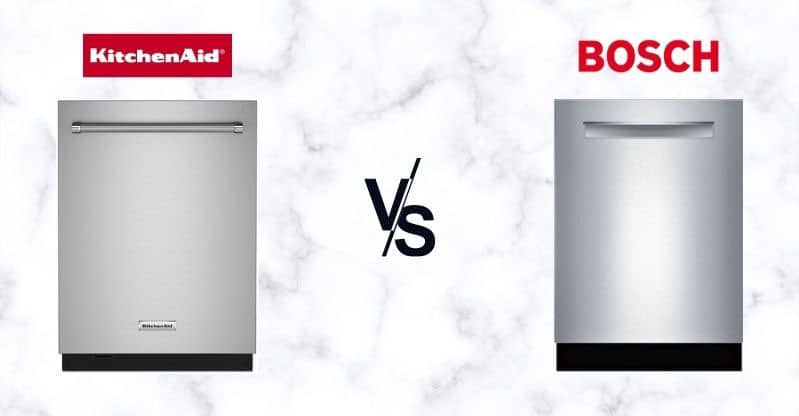
KitchenAid has introduced another new series. After years of being outpaced by Bosch, KitchenAid’s new series is worth considering.
KitchenAid offers two series. The 200 series boasts a 39 dB silence rating at approximately $999.
Their M-series now features four levels of wash action and a drying system inspired by Miele.
The dishwasher allows air from the kitchen into the side of the machine.
The M Series’ newer dishwasher introduces a refreshed top rack and washing system. Its drying cycle utilizes heat in an already warm dishwasher.
However, Bosch’s dishwashers are quieter and offer superior drying in the CrystalDry series.
Their PowerControl feature allows users to wash with varying intensities.
While KitchenAid has reduced its prices and might be more affordable, Bosch remains the superior dishwasher.
Read More: Bosch vs. KitchenAid Dishwashers
Bosch vs. Miele Dishwashers
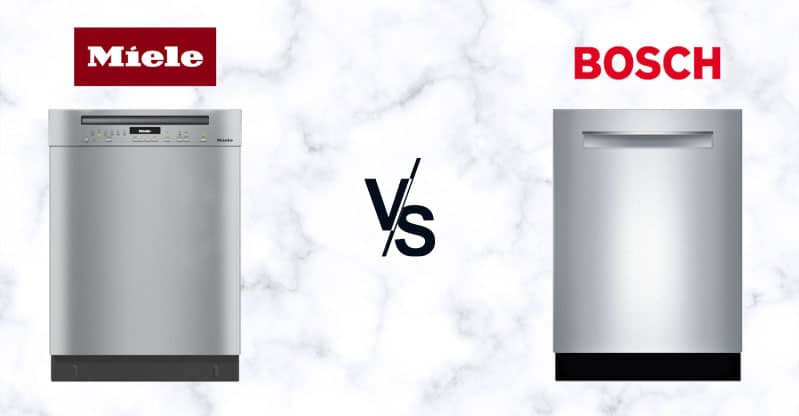
Miele is the best wash and dry system. It has full-wash arms on the top and bottom.
In our tests, Miele performed the best in both washing and drying, surpassing even the 800 Series, thanks to their Auto Dos dispenser and system.
Their clean air drying allows air into the side of the dishwasher. The hot, moist air is drawn to the “cooler” side and then dissipates as water.
Miele also has the best racks, as they are all removable and adjustable.
However, the Miele is priced over $2000, compared to $1349 for the 800 Series.
Read More: Bosch vs. Miele Dishwashers
Bosch vs. Beko Dishwashers
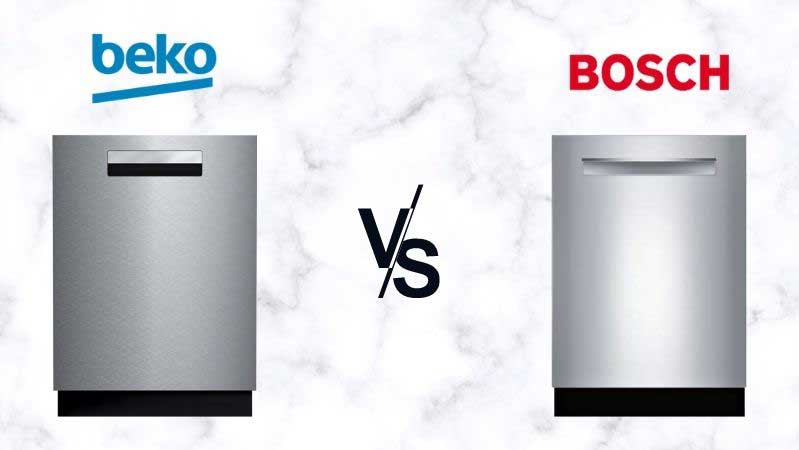
Beko’s $699 dishwasher is comparable to the Bosch 100 Series in price but is quieter at 45 dB and is all steel, whereas the Bosch is made of metal and plastic.
However, Beko offers a feature-loaded model at $1099 with a free installation and special intense cycles, as well as separate sprays to power out tough stains.
At 39 dB, it is the quietest in its class and is a good alternative to the 300 Series.
They also offer affordable panel options.
Read More: Beko vs. Bosch Dishwashers
Like what you are reading? Learn more in our Dishwasher Buying Guide, which offers how-to strategies and buying tips to save you money. Over 1 million people have trusted a Yale guide. We never sell or share your private information.
How to Buy a Bosch Dishwasher
Every Bosch dishwasher can heat the water to 161 degrees, and most use no-heat condensation drying.
Bosch Wi-Fi Connectivity
I hesitate to mention Wi-Fi so early, but all are Wi-Fi enabled, allowing you to turn the washer on or off remotely.
You can customize your cycles in the higher series as well.
Styles of Bosch Dishwashers
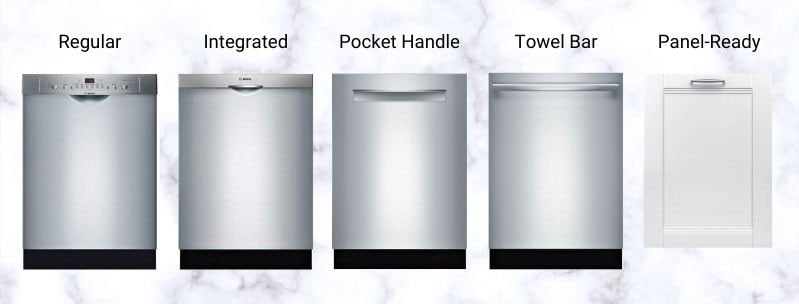
Many of the dishwashers are the same but with different-looking fronts. There are five styles of Bosch dishwashers.
Examine the series and features. Then, compromise on the style, like switching from a towel bar handle to a pocket handle or a regular front.
- Regular: Essentially, it’s a dishwasher with controls on the front.
- Integrated: Controls on the front with a “scoop” handle under the control panel.
- Pocket handle: Similar to an integrated handle, but with a spot in the door for your hand. The pocket handle has become popular because it matches every brand.
- Towel Bar: Another integrated dishwasher with a towel bar handle. It’s intended for towels and matches the handles of other Bosch appliances. However, it might not align exactly with different brands.
- Panel-Ready: Some series are available with no front, allowing you to place your custom cabinet front on the dishwasher.
We recommend paneling only European-made dishwashers, like Bosch, Beko, and Miele, because they fit within a 24-inch space and won’t protrude from your cabinets.
Bosch Dishwasher Wash Cycles
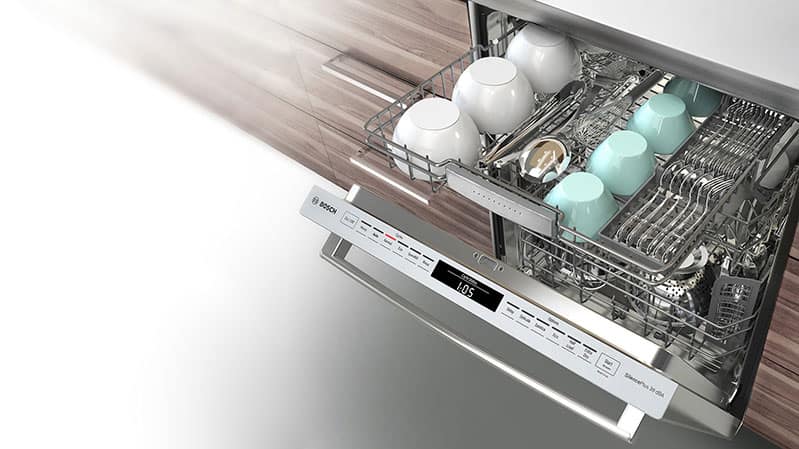
Dishwashers operate based on time and temperature.
A Bosch Heavy or Pots and Pans cycle will wash your dishes longer and at a higher temperature.
A China or Crystal cycle uses less time and a lower temperature, similar to most dishwashers.
The Water Softener Cycle removes hard water spots caused by lime deposits and softens water to appropriate levels.
Hard water can leave spots on your dishes and create other issues. Buying a dishwasher with a softener is an excellent choice, especially if you have well water.
The Eco Cycle is ideal for delicate dishes and glasses. This cycle reduces energy usage by lowering the temperature and cycle length. It’s a shorter cycle, so don’t use it for dishware with baked-on food.
The SpeedPerfect™ Cycle provides up to 25% faster cleaning on a normally soiled load of dishes.
The Favorites feature lets you program your customized cycle directly on the dishwasher.
Benchmark and 800 Series
These two series feature the “PowerControl” spray arm:
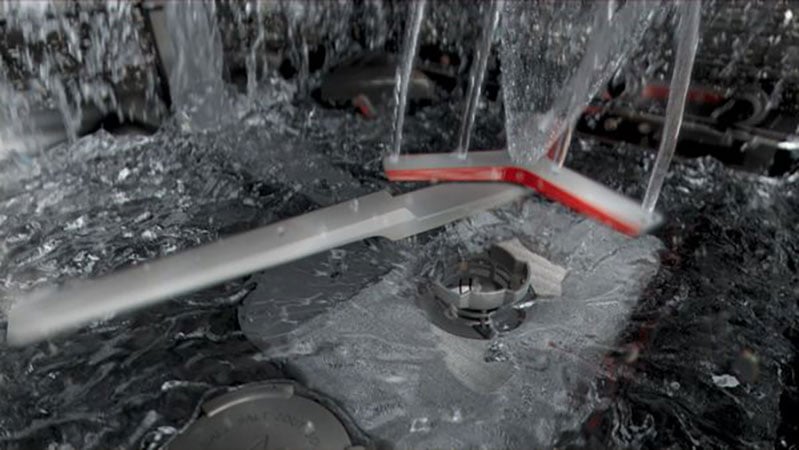
You can set the lower rack to wash in four different quadrants using Bosch’s HomeConnect App.
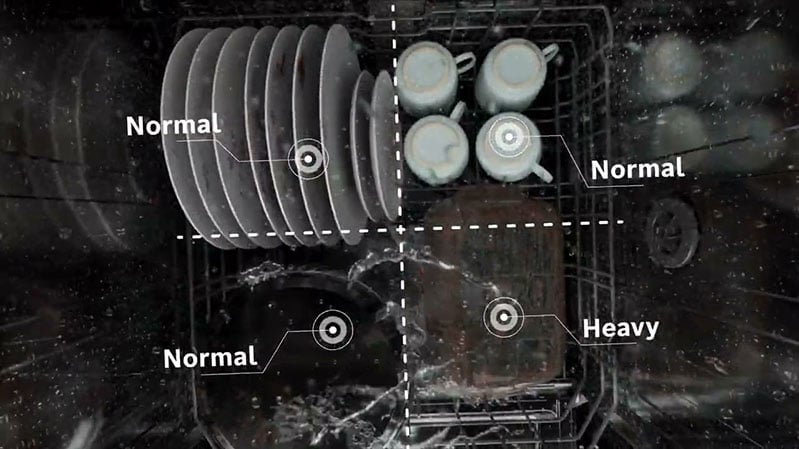
This allows you to wash light, medium, and heavy loads and control the spray’s intensity to clean china, baked-on lasagna dishes, or both in the same wash.
Bosch Dishwasher Drying Features
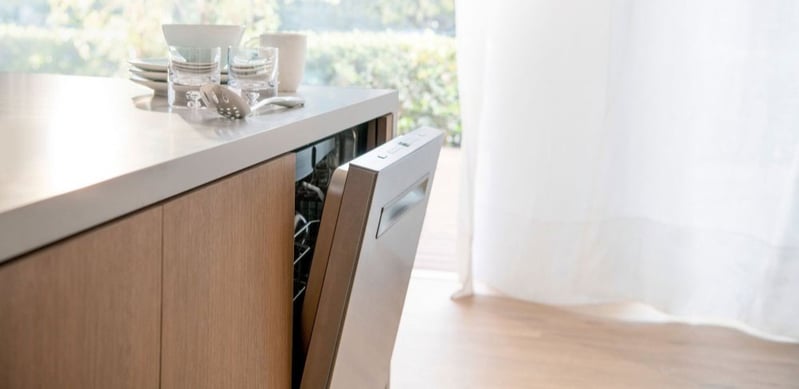
ExtraShine
The ExtraShine option can be used with most wash cycles (except Rinse). It enhances the cleaning and shininess of dishes by raising the temperature and extending the drying time.
Essentially, it dries your dishes more efficiently by using additional time and temperature.
The Extra Dry option is ideal for use in tandem with any wash cycle. This option further enhances drying results by raising the temperature and prolonging the drying time.
Condensation Drying
Bosch consistently uses Condensation Drying, which combines residual steam with jet drying. This method provides average drying results and isn’t as effective on plastics compared to brands like Miele or KitchenAid.
The next two cycles are newer and have enhanced Bosch’s drying capabilities. They’re featured in Bosch’s superior dishwasher models.
AutoAir
Bosch’s AutoAir drying system automatically opens the door to expedite the drying process at a cycle’s end by releasing steam and heat.
If you prefer washing and drying dishes at night, AutoAir is an especially useful feature. The residual steam doesn’t condense back into water, leaving a thin coat on your dishes.
AutoAir is exclusive to Bosch’s 500 series models. Brands like Miele, some Samsung models, and Beko also offer similar features.
CrystalDry
Bosch dishwasher models equipped with CrystalDry contain Zeolite. This volcanic element is versatile, used in everything from supplements to industrial cleanups.
In dishwashers, Zeolite generates heat and absorbs moisture – exactly what a drying cycle should accomplish.
We tested Zeolite in Thermador dishwashers (manufactured by the same company as Bosch) in their 20-minute wash and dry cycle and found it effective, even on plastics.
The CrystalDry feature is available in all Bosch 800 and Benchmark series models.
What Are the Best Bosch Dishwasher Features?
1. Bosch Dishwasher Racks
Every dishwasher, except the 100 series, has a third rack. The higher-end Bosch dishwashers feature a more flexible rack.
- Adjustable RackMatic: The top rack can be adjusted both vertically and horizontally. It offers nine positions to accommodate a variety of plates and trays.
- 3rd Rack Configuration: Ranges from the 100 Premium to the Benchmark series, providing storage for silverware and more.
2. Levels of Quietness
One significant difference among Bosch dishwashers is their noise levels, ranging from 50-38 dB. (For further information, refer to “The Quietest Dishwashers by Decibel Rating“).
In our tests, we found that 44 decibels is quiet enough that you won’t hear your dishwasher running.
However, it’s unnecessary to upgrade from a 44 dB model to a pricier one solely for reduced noise. The upgrade is only justified if you appreciate other features.
Bosch’s 500, 800, and Benchmark series either meet or surpass this standard. Here’s a sound comparison between 44 and 55-decibel dishwashers in a kitchen setting:
3. Leak Protection
All Bosch dishwashers come with leak protection. The AquaStop feature employs sensors to halt water intake in their advanced models, spanning the 300 to Benchmark series.
4. Drying
The drying capability of the 500 series is commendable, but the 800 and Benchmark series particularly stand out in this regard for their price point. Only Miele’s G7000 series performed better.
Why You May Not Want a Bosch Dishwasher:
- Cost: Bosch’s superior dishwashers are priced between $1149-1349. Many other brands have reduced their prices, so it might be worth considering other options.
- Quietness: The story has two sides. The 100 and 300 series don’t achieve the 44-decibel quietness benchmark, operating at 46 to 50 decibels.
- No Hard Food Disposer: If you dislike scraping your dishes clean before loading, prepare to clean the filter located at the dishwasher’s base. That said, several other brands, including Miele and KitchenAid, also use filters.
- No Designated Bottle or Silverware Sprays: Brands like Profile and Beko offer specialized sprays to cleanse residue from the bases of sports and baby bottles.
Additional Resources
Want to learn more about Bosch, Miele,KitchenAid, and other dishwashers?Download the Yale Dishwasher Buying Guide with features, specs, and inside buying tips to all the major brands. Over 1 million people have downloaded a Yale Guide.
Related Articles:



